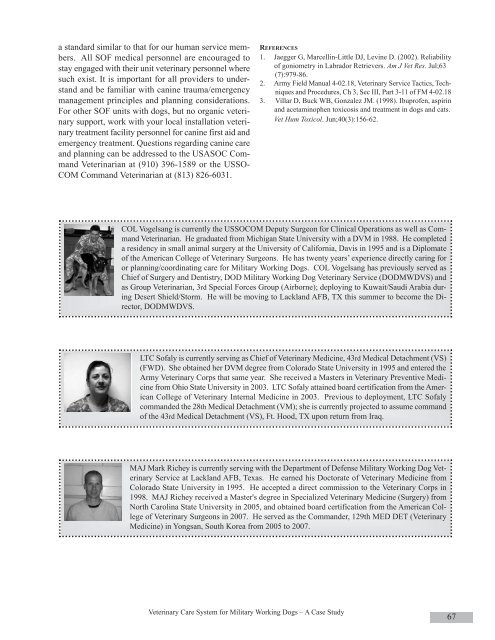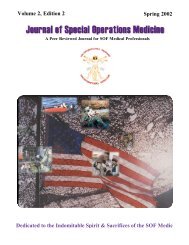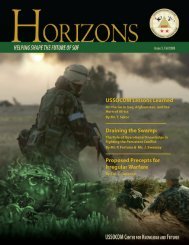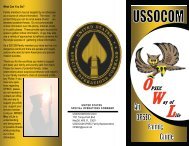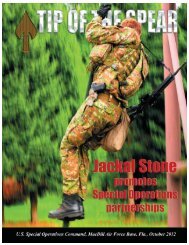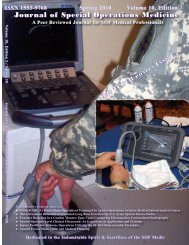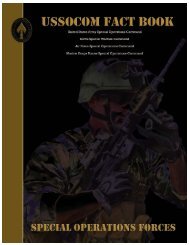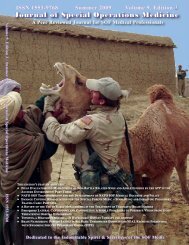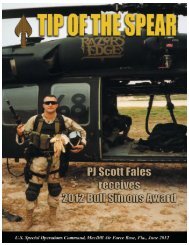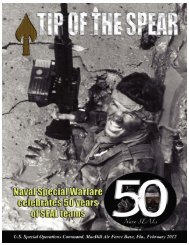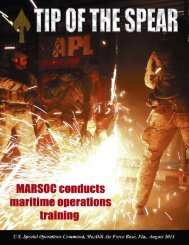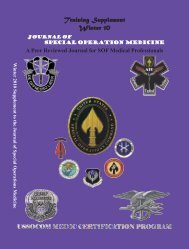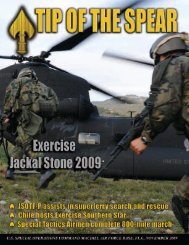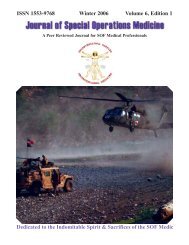DOD. There are approximately 30 personnel on staffinclude VCOs who are board-certified in surgery, internaland/or emergency medicine, and radiology. TheDODMWDVS has two operatories equipped with fullinstrumentation for orthopedic, general/soft tissue, laparoscopic,and neurological surgery. A full laboratoryprovides complete blood count and most chemistrypanels. Imaging capabilities include digital radiography,fluoroscopy, and ultrasound. The DODMWDVShas a canine physical therapy/rehabilitation sectionwith an underwater treadmill and is staffed by a boardcertifiedphysical therapist/rehabilitator. A brand newfacility will open in late spring or early summer of2008 which will include a CT machine in addition toall current capabilities.The DODMWDVS serves as the referral centerfor all MWDs and provides professional and technicalassistance to VCOs and 68Ts throughout DOD.OVERVIEW OF VETERINARY CAREFew units will have veterinary personnel deployedwith them to support their dogs and those thatdo will not likely have those assets with them at pointof injury. As such, the handler will be the first responder,unless the handler has been incapacitated. In thatsituation, the Medic would likely perform initial firstaid. Though basic Tactical Combat Casualty Carephases of care can be directly applied to the injured canine,by both handler and Medic must plan for and addressa few differences for canine treatment. First, theCombat Application Tourniquet will not work on a caninelimb due to the limb’s due to the relatively smalldiameter of the canine limb.. Tourniquets for the caninepatient will need to be improvised using a cravat/windlass,Penrose drain, or similar expedientmethod. Hemostatic dressings; however, should beused on the dog as they would on a human. Obviously,the nasopharyngeal airway will not be useful in the caninecasualty and the combat pill pack contents are notappropriate for the dog. Moxifloxacin is not yet commonlyused in the dog, but what evidence that doesexist implies a dose of 2 to 5mg/kg as appropriate (personalcommunication). As such an average workingdog would receive 150 to 200mg orally. Maximumtherapeutic meloxicam dose (per package insert) for adog is only 0.2mg/kg which would be approximately6mg for an average SOF dog. The combat pill packdose of meloxicam is more than twice the dog dose(15mg). High doses of non-steroidal anti-inflammatorydrugs (NSAID) in the dog can cause significant todeadly sequelae. Acetaminophen is not frequentlyused in dogs as it can cause methemoglobinemia andhepatic necrosis. 3 With the current combat pill packfor humans, a working dog could receive half a tabletof the moxifloxacin and half a tablet of the meloxicam;that is if you could get the dog to swallow the medications.If the dog is distressed, it may not allow handsin its mouth or may not swallow the tablets if theycould be placed in the mouth. In the author’s opinion,no acetaminophen should be administered. As the useof dogs in combat becomes more frequent, developmentof a Tactical Canine Combat Casualty Care(TCCCC or TC4) program should be entertained.One of the most important things that will helpensure the best outcome for MWDs is prior veterinarysupport planning. CASEVAC/MEDEVAC for dogsmust be incorporated into the medical support plan.Units should know where the closest veterinary unitsare located, what their capabilities are, and how to contactveterinary personnel. Units wishing to get deployedveterinary unit locations and contactinformation may contact the USASOC or USSOCOM<strong>Command</strong> Veterinarians.Once the dog is received by the deployed veterinaryteam/detachment, the dog’s unit must maintaincontact with the veterinary unit. In some cases, a dogmay not allow veterinary care to be given withoutbeing with its handler and the handler may be requiredto remain with the dog at the veterinary unit’s location.Should a dog need further treatment at a LevelIV or V veterinary facility, it is the responsibility of thesupporting veterinary detachment to coordinate evacuationwith their supporting medical regulating officefor movement and referral arrangements with the receivingveterinary facility. Note that the USSOCOMliaison officer (LNO) at the Landstuhl Regional MedicalCenter is responsible for assisting with human casualtiesand will also assist with canine casualties goingthrough Germany. The LNO has previously arrangedlodging and transportation for evacuated dogs and theirhandlers/escorts, which has proven to be very helpful.The Landstuhl USSOCOM LNO office phone is DSN(314) 486-7776; cell phone is 0162-273-0111.Veterinary units and dog-owning units mustmaintain communication as there is no real in-transitvisibility on canine patients. Once the dog has beentreated/rehabilitated, the veterinary facility will makearrangements with the owning unit for release andtravel to home station or other location as required.Dogs are being used with increasing frequencyby SOF units, as they are with conventional units.With larger numbers of dogs performing more at-riskmissions, it is imperative that these valuable and difficult-to-replaceassets are cared for in a manner and to66Journal of <strong>Special</strong> <strong>Operations</strong> Medicine Volume 8, Edition 2 / <strong>Spring</strong> 08
a standard similar to that for our human service members.All SOF medical personnel are encouraged tostay engaged with their unit veterinary personnel wheresuch exist. It is important for all providers to understandand be familiar with canine trauma/emergencymanagement principles and planning considerations.For other SOF units with dogs, but no organic veterinarysupport, work with your local installation veterinarytreatment facility personnel for canine first aid andemergency treatment. Questions regarding canine careand planning can be addressed to the USASOC <strong>Command</strong>Veterinarian at (910) 396-1589 or the USSO-COM <strong>Command</strong> Veterinarian at (813) 826-6031.REFERENCES1. Jaegger G, Marcellin-Little DJ, Levine D. (2002). Reliabilityof goniometry in Labrador Retrievers. Am J Vet Res. Jul;63(7):979-86.2. Army Field Manual 4-02.18, Veterinary Service Tactics, Techniquesand Procedures, Ch 3, Sec III, Part 3-11 of FM 4-02.183. Villar D, Buck WB, Gonzalez JM. (1998). Ibuprofen, aspirinand acetaminophen toxicosis and treatment in dogs and cats.Vet Hum Toxicol. Jun;40(3):156-62.COL Vogelsang is currently the USSOCOM Deputy Surgeon for Clinical <strong>Operations</strong> as well as <strong>Command</strong>Veterinarian. He graduated from Michigan State University with a DVM in 1988. He completeda residency in small animal surgery at the University of California, Davis in 1995 and is a Diplomateof the American College of Veterinary Surgeons. He has twenty years’ experience directly caring foror planning/coordinating care for Military Working Dogs. COL Vogelsang has previously served asChief of Surgery and Dentistry, DOD Military Working Dog Veterinary Service (DODMWDVS) andas Group Veterinarian, 3rd <strong>Special</strong> Forces Group (Airborne); deploying to Kuwait/Saudi Arabia duringDesert Shield/Storm. He will be moving to Lackland AFB, TX this summer to become the Director,DODMWDVS.LTC Sofaly is currently serving as Chief of Veterinary Medicine, 43rd Medical Detachment (VS)(FWD). She obtained her DVM degree from Colorado State University in 1995 and entered theArmy Veterinary Corps that same year. She received a Masters in Veterinary Preventive Medicinefrom Ohio State University in 2003. LTC Sofaly attained board certification from the AmericanCollege of Veterinary Internal Medicine in 2003. Previous to deployment, LTC Sofalycommanded the 28th Medical Detachment (VM); she is currently projected to assume commandof the 43rd Medical Detachment (VS), Ft. Hood, TX upon return from Iraq.MAJ Mark Richey is currently serving with the Department of Defense Military Working Dog VeterinaryService at Lackland AFB, Texas. He earned his Doctorate of Veterinary Medicine fromColorado State University in 1995. He accepted a direct commission to the Veterinary Corps in1998. MAJ Richey received a Master's degree in <strong>Special</strong>ized Veterinary Medicine (Surgery) fromNorth Carolina State University in 2005, and obtained board certification from the American Collegeof Veterinary Surgeons in 20<strong>07</strong>. He served as the <strong>Command</strong>er, 129th MED DET (VeterinaryMedicine) in Yongsan, South Korea from 2005 to 20<strong>07</strong>.Veterinary Care System for Military Working Dogs – A Case Study67
- Page 3:
Spring 08 Volume 8, Edition 2From t
- Page 6 and 7:
From the Command SurgeonWARNER D.
- Page 9 and 10:
Participants of the first USSOCOM C
- Page 12 and 13:
Component and TSOC Surgeons, and wh
- Page 14 and 15:
Jay Sourbeer, MDCAPT, USNCommand Su
- Page 17 and 18:
Ricardo Ong, MDLTC USASOCCENT Surge
- Page 19 and 20: Wm. John Gill, PA-C MPASLTC USASOCS
- Page 21 and 22: MG Salvatore F. Cambria, commanding
- Page 23 and 24: The Joint Staff and Combatant Comma
- Page 25 and 26: For the RG-33 MRAP SOF Variant vehi
- Page 27 and 28: USSOCOM Education and Training Upda
- Page 29 and 30: OCONUS LTT requires all the same pr
- Page 31 and 32: Better Training Through Lessons Lea
- Page 34 and 35: mans, though thoracocentesis would
- Page 36 and 37: am sure someone will read it and wi
- Page 38 and 39: also litter Urgent based on the EOD
- Page 40 and 41: ISSUE: MAST pantsRECOMMENDATION: I
- Page 42 and 43: use and amount of carried hemostati
- Page 44 and 45: France, Britain honor U.S. woman wh
- Page 46 and 47: Degree plan for 18D Soldiers announ
- Page 48 and 49: 44 Current Events
- Page 50 and 51: 46Journal of Special Operations Med
- Page 52 and 53: Necessity of Medical Personnel on t
- Page 54 and 55: Aside from the nuisance that flies
- Page 56 and 57: spondence in NEJM 352:2651-2653 Jun
- Page 58 and 59: Tympanic Membrane Perforation in IE
- Page 60 and 61: overall picture of wounds received,
- Page 62 and 63: than did IEDs. We may conclude that
- Page 64 and 65: gesic medications, tourniquets, spl
- Page 66 and 67: dog was included in the unit CASEVA
- Page 68 and 69: aged four therapy sessions per week
- Page 72 and 73: Air Force Special Operations Comman
- Page 74 and 75: surgical care for up to ten surgica
- Page 76 and 77: function as the OR circulator durin
- Page 78 and 79: gaged at one time. With long term s
- Page 80 and 81: Clinical Diagnoses in a Special For
- Page 82 and 83: noses assigned, some conditions exi
- Page 84 and 85: MAJ Jim Lynch, MD, MS, is a 1989 gr
- Page 86 and 87: Recombinant Activated Factor VII In
- Page 88 and 89: The Value of Conservative Treatment
- Page 90 and 91: Acute Mountain Sickness: Influence
- Page 92 and 93: Paramedic Perceptions of Challenges
- Page 94 and 95: From Warrior to Healer: 99 True Sto
- Page 96 and 97: Needle Thoracostomy in the Treatmen
- Page 98 and 99: patients (2.45%) a 4.5cm needle cou
- Page 100 and 101: Chest Wall Thickness in Military Pe
- Page 102: Figure 3. Plot of horizontal versus
- Page 105 and 106: Rescue Training, Inc.9-A Mall Terra
- Page 107 and 108: AVIATION MEDICINE AND PATIENT TRANS
- Page 109 and 110: Center for Disaster and Humanitaria
- Page 111 and 112: Rare Diseases: http://www.raredisea
- Page 113 and 114: Med Anthro Tutorial http://anthro.p
- Page 115 and 116: Drug Information Online: http://www
- Page 117 and 118: SEARCH AND RESCUEConfined Space Res
- Page 119 and 120: SOCM GLENN MERCERINTRODUCTION“…
- Page 121 and 122:
on supplements for this unit of one
- Page 123 and 124:
OBSERVATIONSFigures 2 depicts the a
- Page 125 and 126:
Photo 3Photo 4Photo 5MED Quiz 121
- Page 127 and 128:
ANSWERSQuestion 1:Morphology: these
- Page 129 and 130:
Meet Your JSOM StaffEXECUTIVE EDITO
- Page 131 and 132:
Special Forces Aidman's PledgeAs a


